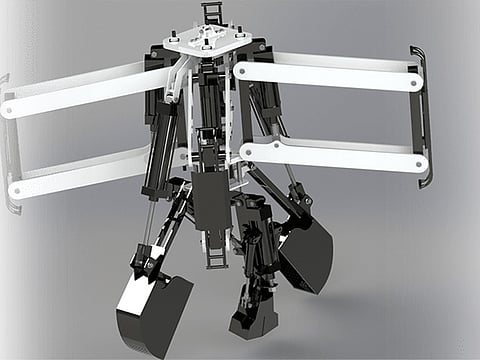Robots to soon clean up manholes in Kerala
The robot, equipped with Wi-Fi, Bluetooth and control panels, has four limbs and a bucket system to scoop out waste from sewers

Thiruvananthapuram: In a first for Kerala, the state government will soon be employing the services of robots to clean sewer holes.
The trial runs of the robot, developed by a start-up company, GenRobotics, have been successfully held and the product will be launched next week, Kerala Water Authority (KWA) Managing Director, A. Shainamol said.
“The Kerala government is very excited with the project,” Shainamol told PTI.
The robot, equipped with Wi-Fi, Bluetooth and control panels, has four limbs and a bucket system attached to a spider web-like extension to scoop out waste from sewers.
The project is supported by KWA, which has joined hands with Kerala start a mission to transform new ideas into practical technologies to address issues relating to pipe leakage and sanitation.
“Our intention is to promote local talent. Now the product, being fully funded by the government, is ready and it will be launched next week,” she said.
Initially, the services of the robot, christened ‘Bandicoot’ will be utilised in Thiruvananthapuram, which has more than 5,000 manholes.
The trial run of the robot, developed by the nine-member group of youngsters from varying engineering streams, had been conducted successfully in the state capital recently, CEO and Chief Product architect of GenRobotics, Vimal Govind, said.
The youngsters have given up their steady jobs to find a solution to end manual scavenging in an effort to bring in some semblance of dignity to the lives of these ‘invisible’ men who are paid a pittance, between Rs300-Rs500 (Dh17-Dh28), for their efforts that run into several hours.
According to Govind during the trials held near the Medical college here, about 30kg of garbage was pulled out by the robot and they were shocked to find sanitary napkins, clothes and surgical blades among other waste in the clogged manholes.
Within an hour, the robot could clean four manholes on the first day itself with ease and it did not face any problem to manoeuvre its way to different types of manholes.
“This will be a life-changing opportunity for the cleaning men. Their life will become better. Though happy with the product, they are apprehensive if they will lose their source of livelihood,” he said.
However, there was no cause for any worry says Chief Operating Officer Rashid K as their plan was to train existing workers to operate the robot, which was as easy to handle as a remote controlled toy car.
All the commands in the user interface are in English as of now.
But this can be converted to any local language for easy understanding of the scavengers, he said.
The team took seven-eight months to design the semi automatic robot.
An MOU has already been signed between the Kerala Water Innovation Zone under the KWA and Kerala Start-up Mission (KSUM) for transfer of technology.
‘Attukal Pongala’ on March 2 will be the litmus test for project ‘Bandicoot’, which will commence operations by cleaning sewer holes in the city during the festival when hundreds of thousands of women from all over the country will converge here for Pongala festival.
Enquiries relating to the robot have come in from the neighbouring states of Tamil Nadu, Karnataka and Maharashtra besides from countries such as Canada and the UK.
The team has also been invited to attend the National consultative workshop on Solid Liquid Resource Management (SLRM) on February 22-23 in Delhi, which is an initiative of Swachh Bharat, or Clean India, campaign to introduce the robot.
Founded in 2015, GenRobotics was initially focusing on powered exoskeletons, which are robotic suits that can help humans to reduce the amount of physical effort exterted in certain jobs, some of which require heavy lifting.
The robot is powered by pneumatics (using gas or pressurised air) since using heavy electronic equipment in sewers is risky as they can react with the explosive gases present in the manhole.
Since there are no official figures on the number of people involved in manual scavenging in Kerala, the state government is planning to undertake a pilot study at Ernakulam or Kozhikode, Suchitwa mission sources said.
Based on the outcome of the pilot study, a statewide survey would be held, the sources added.
Sign up for the Daily Briefing
Get the latest news and updates straight to your inbox



